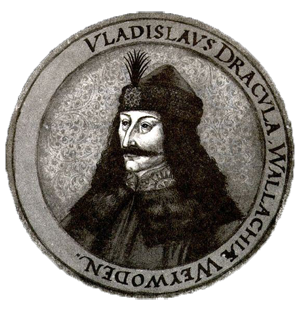By THIRSTY

Matt Cutugno
|
Dracula by Bram Stoker was first published on May 26, 1897. After years of research, Stoker’s iconic invention of Count Dracula burst into popular literature fully formed and unyieldingly formidable. Many have speculated over the past hundred years about the genesis of Stoker’s “hero.” Few have known for sure.
IN DRACULA’S TIME is the untold story of an ancient biography of Vlad the Impaler that inspired Bram Stoker’s creation of Dracula. For the first time, Stoker’s secret source, hidden from view for almost a century, makes an indelible connection between Vlad and Dracula.
A tale told by a witness to literary history, IN DRACULA’S TIME by Matt Cutugno gives voice to the real Dracula - a leader, a warrior and a cruel defender of his kingdom. To get your blood flowing, whether you are a fan of vampires or horror stories or gothic novels, we include the first chapter of how it began to let you in on a secret that has been kept from the public since Bram Stoker’s death on April 20, 1912.
IN DRACULA’S TIME
By
Matt Cutugno
Copyright © Matt Cutugno 2011
All Rights Reserved
How It Began
I met him in the autumn of 1969. I was a first-year college student in Pennsylvania. He was an old man. He never told me his age and I never
asked. I avoided him at first;
disinterested in anyone so elderly. He was tall, though bent over, with pale skin and wispy white hair. He wore dark, well-worn clothes and had
the smell of frail grandfathers.
As I sat near where he was sitting, he took note of the book
I was reading, Dracula by Bram Stoker. He leaned toward me and started to
laugh, at first to himself, and then loud enough that I couldn’t help but
notice and be annoyed.
“What?” I said finally.
“That’s a good book.” Then he repeated, “Good book.” I detected an accent in his English.
“It’s okay.”
I was trying to concentrate on the journal of Jonathan
Harker and his first meeting with the elegant Count Dracula in his castle in
Transylvania. In truth, my
literary tastes at the time ran to Kurt Vonnegut and Richard Brautigan, but
this famed story of vampires was required reading in my English Lit class, so I
was dutiful.
“I knew him,” the old man said, interrupting my fragile
concentration.
“You knew Dracula?”
He gave me a patient half-smile. “I knew Stoker,” he replied, almost off-handedly.
I was skeptical. There was a picture of Bram Stoker on the back cover of my paperback, a
black and white photo that seemed from distant times past. A glance at the accompanying text told
me the author died in 1912, and judging from the old man’s appearance, I
supposed it might have been possible. Could I be in the presence of a witness to literary history?
“We spoke several times,” the old man continued, “or rather
Mr. Stoker spoke and I listened. I
was a respectful young man.”
“That’s cool,” was all I could think to say. I was not persuaded.
At that point, he motioned to have the paperback and leafed
through the pages, commenting under his breath as he did. There was a glint in his eyes as he
handed it back to me.
“This is the kernel of truth. The husk and cob were left behind.”
I didn’t understand, but that was the extent of our first
conversation.
* * *
Our next chance meeting was some weeks later. By then, the cold winter weather had
set in. I was in the campus
bookstore on Allen Street when I spotted him, seated at a table with a
newspaper spread out in front of him. He held an oversized magnifying glass in his shaky right hand as he
concentrated on the newsprint.
He surprised me by looking up, straight at me with
recognition.
“Hello, Dracula,” he said. “Why don’t you have a seat?”
I felt more sympathetic toward him on this second encounter,
perhaps because my own grandfather had passed away a month before. Or maybe it was because I fancied
myself a writer and imagined that I should be interested in people and their
true stories, even if the people were old and their stories probably just
filled with exaggerations.
So I sat down across from him. I watched him turn the newspaper’s page, his hand trembling
and the paper crackling like tired bones. I wanted to say something, anything.
“Where are you from?” I asked.
“Ireland, born in Dublin,” he replied. I nodded and mentally noted that the
author of Dracula was born there too.
“My father was Mr. Stoker’s attending physician and took
care of him after his stroke. The
famed author was a legend…manager of the great Lyceum Theater…related to Sir
Arthur Conan Doyle no less. And,
he stole Oscar Wilde’s girlfriend right away from him, did you know that?” He had a twinkle in his eye. “I was a star-struck boy who loved to
read. I visited him in the
hospital and listened to anything he wanted to tell me.”
I was attentive, but skeptical.
“By the way, I finished Dracula. Like you said, it’s a good book.”
The Dubliner smiled and straightened a fold on his newspaper. “It was certainly successful, but it
could have been better. That’s
what the author used to say—should have been better.”
“Why would he say that?”
“Do you really want to know?” He spoke without looking up from his magnified reading.
“You said yourself it was successful,” I added. “My English Lit professor says it’s the
greatest horror story ever written. What more could it have been?”
“Well young man, let me tell you what it could have been.” He placed the magnifying glass on the
table and leaned toward me.
“When Bram Stoker was researching his book, he made a secret
trip, never been written about, to Eastern Europe where the vampire legends
originated. He told me he was
shown a fantastic manuscript, written in ink on thick vellum from the
1400s. Only a select few knew of
its existence. It was…,” he paused
as if for the effect, “the authorized biography of Vlad Drakul, the terrible
Impaler Prince.”

Vlad the Impaler, Circa 1600
|
“Who was he?” I asked.
“He was a great warrior, the lord of Wallachia, a kingdom
north of the Danube River during a time when the Balkans peninsula was being
overrun by Turks of the Ottoman Empire.” The old man pointed a bony finger at me. “He was the historical figure that the character of Dracula
was based upon. Mr. Stoker told me
all about that ancient biography. It was filled with tales of great battles and fierce struggles. It was more amazing than any fiction of
ghouls and vampires.”
“I’ve never heard that,” I said.
“And
you likely never will. He told me how he carefully examined the old
manuscript; he got ideas from it—the dark gothic landscape, the name of
his main character—and Lord Drakul became Dracula. You
know droch ola, Gaelic for ‘bad blood.’”
“Where is that biography now?”
“He was not permitted to take it with him. He left it behind in Romania and no one
knows what happened to it.”
“And then?” I asked.
“He wrote a fiction filled with undead, blood sucking creatures. The true tale was left untold. Can you beat that?”
I sat in silence for a few moments —unsure if I
believed the story he was spinning. The old man squinted at me as if he was reading my mind.
“Do you know what it means to be ‘bloodthirsty’?” he asked
wryly.
“It means you are violent. You enjoy it.”
He considered my reply, as if he was teacher and I his
student. “The lord Vlad Drakul
mixed the blood of animals he killed during the hunt into his wine in order to
gain their spirits. It was all chronicled on those vellum pages. Mr. Stoker told me that he just
borrowed the idea.”
“What else is in the biography?” I asked. My
curiosity had been piqued.
The old man took a deep breath and folded his hands in front
of him. He glanced around, as if
he was the keeper of dark secrets that he must protect, and continued.
“Where to begin—I suppose the year 1476 in Wallachia
is as good a time and place as any.”

